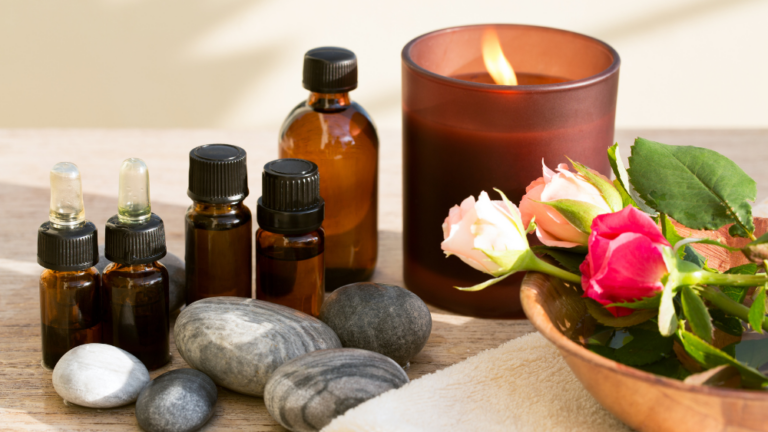
Ever found yourself drawn to the scent of a blooming flower or lulled into serenity by the calming aroma of lavender? That’s aromatherapy for mental health, playing its magic right under your nose. It’s an ancient practice, wrapped in whispers and hushed secrets of nature. Picture this: You’ve had a tough day, feeling stressed and overwhelmed. Now imagine lighting up some soothing sandalwood incense, closing your eyes, taking deep breaths… Doesn’t that feel like a comforting embrace? This post will unravel aromatherapy’s mysteries. Unleashing powerful essential oils’ potential to improve our lives. Additionally, delve deeper into their uses. However, is it all rosy? We’ll look at safety considerations too because understanding is key when venturing on any new journey.
What is Aromatherapy?
Aromatherapy, also known as essential oil therapy, involves the use of plant extracts to promote health and well-being. This practice traces its roots back to ancient civilizations who used aromatic plant compounds for a variety of purposes. For example, religious ceremonies, beauty care, food preparation, and medical treatments. The phrase “aromatherapy” was initially coined by French chemist Rene-Maurice Gattefosse in the early 1900s. After burning his hand during an experiment and quickly dousing it with lavender oil – one of the most popular essential oils – he noticed how fast his burn healed without infection or scarring. This led him to explore more about these potent botanicals’ healing properties.
Essential Oils: The Heartbeat of Aromatherapy
Essential oils are highly concentrated forms extracted from plants like flowers, leaves, bark or roots that carry the aroma. Hence, they’re often termed ‘essential’. These are typically mixed with carrier oils before applying them topically because their high concentration can be harmful if used undiluted.
Beyond just smelling good, research suggests that certain aromas can have real mental health benefits too. For example, studies indicate lavender may help reduce anxiety while peppermint could boost energy levels. However, remember each person’s reaction may vary so you’ll need to find what works best for you.
Inhalation vs Topical Application
In aromatherapy, two primary methods are employed: inhalation and topical application.
Inhalation: involves breathing in the oils either by diffusing them into the air or directly inhaling from a bottle. This method is said to influence mood and emotional well-being due to its direct impact on the olfactory system, which communicates with the brain’s limbic region – a key player in emotions, memory, and arousal.
Topical Application: This is the practice of applying essential oils directly to the skin. It allows for the absorption of the therapeutic properties of essential oils through the skin. As a result, this can have a range of physical and psychological effects on the body. Topical application is a popular approach in aromatherapy as it provides localized benefits. For instance, relieving muscle tension, soothing skin irritations, or promoting relaxation.
Essential Oils and Their Uses
Lavender Oil
Lavender oil is one of the most popular essential oils in aromatherapy. It is renowned for its soothing and calming properties. Therefore, making it a go-to choice for relaxation and stress relief. Lavender oil is often used to promote a sense of tranquility and improve sleep quality when diffused in the air or added to a bath. Its natural analgesic qualities make it an excellent option for relieving headaches, muscle aches, and minor skin irritations when applied topically with a carrier oil. In addition, lavender’s pleasant aroma makes it a common choice for scenting rooms, linens, and personal care products. This essential oil’s broad range of therapeutic benefits and gentle nature has made it a staple in the world of aromatherapy.
Rosemary Oil
Rosemary oil is an aromatic essential oil derived from the fragrant leaves of the rosemary herb. It has a long history of use in aromatherapy and traditional medicine. Rosemary oil is celebrated for its ability to enhance mental clarity, concentration, and memory. Therefore, making it a popular choice for those seeking mental alertness and focus. Additionally, its soothing aroma can help alleviate stress and fatigue. Beyond its cognitive benefits, rosemary oil has been used topically to relieve muscle pain and promote hair growth due to its potential to improve circulation. Additionally, it serves as a natural preservative in various cosmetic and skincare products.
Peppermint Oil
Peppermint oil is a refreshing essential oil derived from the leaves of the peppermint plant. Its distinctive cool, minty aroma is instantly recognizable and has a multitude of therapeutic uses. One of its most notable qualities is its ability to provide relief from various forms of discomfort. When applied topically in a diluted form, peppermint oil can soothe muscle aches, headaches, and digestive issues. Inhaling its aroma or using it in a diffuser can help alleviate mental fatigue and boost alertness. Therefore, making it a popular choice for increasing focus and concentration. Furthermore, peppermint oil is often used as a natural remedy for respiratory congestion and as a flavoring agent in food and beverages.
Eucalyptus Oil
Eucalyptus oil is an essential oil derived from the leaves of eucalyptus trees, native to Australia but now grown worldwide. This oil is highly regarded for its numerous therapeutic benefits, particularly in respiratory health. Its strong aroma can help clear nasal congestion when inhaled diffused in the air. Eucalyptus oil is often found in over-the-counter chest rubs and cough drops due to its ability to alleviate cold and flu symptoms. Additionally, it possesses antiseptic and anti-inflammatory properties. Therefore, making it an excellent choice for soothing minor skin irritations. For example, insect bites or minor cuts, when diluted with a carrier oil.
Chamomile Oil
Chamomile oil is a gentle oil derived from the flowers of the chamomile plant. There are two primary types of chamomile used in aromatherapy: Roman chamomile and German chamomile, both of which offer distinct yet similar benefits. Chamomile oil is celebrated for its ability to promote relaxation and reduce stress and anxiety when diffused or added to bathwater. Furthermore, chamomile oil is commonly used for skincare. It can soothe irritated skin, reduce redness, and help with conditions like eczema and acne.
Bergamot Oil
Bergamot oil is a fragrant oil extracted from the rind of the bergamot orange fruit, predominantly grown in Southern Italy. It is prized for its citrusy aroma, which is both invigorating and calming. Bergamot oil is frequently used in aromatherapy to alleviate stress, anxiety, and mood swings. Its natural antidepressant qualities can help lift spirits and promote a sense of well-being when diffused or applied topically (with proper dilution). Additionally, it is utilized in the culinary world to flavor Earl Grey tea and various desserts.
Always remember that these oils should be used appropriately. Therefore, diluted with carrier oils if applying topically. And, not ingested unless under professional guidance. Also worth noting are the potential allergic reactions that can occur with essential oils. So, it’s best to do a patch test before fully integrating them into your routine.
There are plenty more essential oils out there each with unique benefits. By understanding their properties and uses, you can choose the right ones for your specific needs. Furthermore, begin reaping the mental health rewards they offer.
How to Incorporate Aromatherapy into Your Routine
Aromatherapy can be an easy, natural way to enhance your mental well-being. Let’s dive right in and discover how you can incorporate it into your daily routine.
Start with Morning Meditation
Morning meditation coupled with aromatherapy creates a powerful routine that sets a fantastic tone for the day ahead. As you engage in meditation, it offers a precious opportunity to center your mind, cultivate mindfulness, and set positive intentions. The calming and grounding effect of meditation can be further enhanced with the use of aromatherapy. Inhaling soothing scents like lavender, chamomile, or frankincense during meditation can deepen your sense of relaxation and focus. Therefore, helping you clear away mental clutter and stress. This sensory experience promotes emotional balance. In addition, it invigorates your senses, preparing you to face the day with renewed energy and a heightened sense of well-being. The combination of morning meditation and aromatherapy becomes a powerful ritual that nourishes your mind, body, and spirit, offering a beautiful and peaceful start to each day.
Daily Skincare Regimen
Incorporating essential oils into your skincare regimen can be a great way to address a variety of skin concerns and enhance your overall complexion. For instance, tea tree oil is celebrated for its potent antibacterial and anti-inflammatory properties. Therefore, making it a valuable addition for those struggling with acne-prone skin. When properly diluted, it can help combat breakouts and reduce redness. On the other hand, rosehip oil is rich in antioxidants and vitamins which contribute to its anti-aging benefits. Additionally, regular use of rosehip oil can help improve skin elasticity, reduce fine lines, and fade scars and dark spots. By customizing your skincare routine with essential oils, you can harness the natural healing powers of these oils. However, it’s essential to conduct a patch test and follow proper dilution guidelines to ensure safety in your skincare regimen.
Create an Aromatic Workspace
Creating a more pleasant work environment is essential for overall well-being. One effective way to achieve this is by incorporating aromatherapy into your workspace. Using a diffuser with scents like peppermint or citrus can have a positive impact on your workday. Research studies have shown that these aromas can increase productivity by stimulating the mind and enhancing focus. The scent of peppermint can help combat fatigue and keep you energized throughout the day. Furthermore, citrus fragrances can boost mood and creativity. By diffusing these pleasant scents, you make your workspace more enjoyable. In addition, create an atmosphere that encourages concentration. Ultimately, making work a more enjoyable experience.
A Relaxing Bedtime Ritual
Capping off the day with a soothing bedtime ritual with aromatherapy can enhance sleep quality and promote a restful night’s rest. Aromatherapy, has long been recognized for its sleep-inducing properties, as supported by research. The calming effects of valerian root oil, can help alleviate anxiety and quiet the mind. Therefore, making it easier to fall asleep and stay asleep. The act of adding aromatherapy into your nighttime routine also serves as a signal to the body that it’s time to wind down. Therefore, aiding in the transition from wakefulness to slumber. This holistic approach enhances the overall quality of sleep. Additionally, it contributes to a more refreshed feeling upon waking. As a result, setting a positive tone for the day ahead.
Choosing Essential Oils
Choosing high-quality, pure essential oils is essential to reap their benefits. When shopping for essential oils, it’s crucial to be discerning and cautious. Look for oils labeled as “100% pure” or “pure essential oil” from reputable brands. Check for detailed information on the label, including the botanical name of the plant, country of origin, and extraction method. Avoid products labeled as “fragrance oil” or “perfume oil,” as they often contain synthetic chemicals and lack the natural compounds that provide health advantages. Additionally, read customer reviews from trusted sources to ensure you’re getting a product that aligns with your specific needs.
Safety Considerations When Using Essential Oils
When using essential oils, it is important to prioritize safety above all else. Despite their natural origins, these potent extracts can cause harm if used improperly.
Dilution is Key
You might think that more oil equals more benefits. But when dealing with essential oils, this isn’t the case. To prevent skin irritation or sensitization, diluting your oils in a carrier oil like coconut or jojoba is crucial. A common rule of thumb for adults is a 2% dilution rate. This means you’d mix 12 drops of essential oil into one ounce of carrier oil. The National Association for Holistic Aromatherapy (NAHA) provides an excellent guide on safe dilution rates.
Beware of Skin Sensitivity and Allergies
Allergic reactions to essential oils are rare but possible. Therefore, conduct a patch test by applying diluted oil to a small area on your inner forearm and wait for any adverse reactions. If redness or itchiness occurs after the application – it’s best not to use that particular blend anymore. Always remember: what works well for others may not necessarily work well for you because each person’s body chemistry differs significantly from another’s.
The Sun Isn’t Always Your Friend
Certain citrus-based essential oils such as lemon and bergamot are photosensitive. Therefore, they can make your skin extra sensitive to sunlight which could lead to severe burns. If you’re planning to apply the oils topically, it’s best to stay away from direct sunlight or cover up the areas where they were used.
Long-Term Effects of Aromatherapy on Mental Health
Aromatherapy is not just a fleeting trend, but an ancient practice with profound effects on mental health. Over time, the potential gains from aromatherapy can be amplified.
Stress Relief and Improved Mood
The stress-relieving properties of essential oils are well-known. Aromas such as lavender and chamomile are known to reduce anxiety and foster tranquility. Research shows that consistent use over time can lead to lower baseline stress levels. This makes you less reactive to stressful situations because your starting point is already calmer.
Beyond calming nerves, certain aromas like citrus or peppermint can also enhance mood. They stimulate serotonin production in the brain – our “happy hormone”. With regular use, these oils may help maintain higher moods consistently. Studies suggest this effect could be long-lasting as it changes the body’s natural response to emotional triggers.
Sleep Improvement
If you struggle with sleep problems or insomnia, aromatherapy might be able to offer some relief. Essential oils such as lavender are famous for their ability to aid restful sleep. Using them regularly before bedtime creates a relaxing routine that signals your mind it’s time for slumber. In the long run, better sleep quality can significantly impact mental health. Adequate rest reduces the risk of mood disorders and helps you handle daily stresses more effectively.
Cognitive Function Enhancement
Some essential oils are known for their ability to boost cognitive function. Rosemary, for instance, has been associated with improved memory and focus. Research suggests that regular use could lead to sustained improvements in cognitive performance over time.
Choosing an Aromatherapist
Finding the ideal aromatherapist may seem daunting, but we have some tips to guide your search. Don’t fret, we’ve got some handy advice to help make your hunt simpler.
Check Their Training and Certification
The first step is to ask about their training. Good therapists have formal education from recognized institutions like the Phoenix School of Massage. They should also hold certification from professional bodies such as the National Association for Holistic Aromatherapy (NAHA) or Alliance of International Aromatherapists (AIA). A therapist’s experience matters too. Those who’ve been practicing longer tend to be more skilled at using essential oils safely and effectively.
Suitability: One Size Doesn’t Fit All
Your personal needs are crucial when choosing an aromatherapist. Some specialize in stress relief while others focus on managing chronic pain or improving mental health with aromatherapy treatments. In addition, it’s important to talk about your needs. To get this information, start by having a chat with potential therapists. Discuss what you’re hoping to achieve through therapy and listen carefully to how they respond.
Evaluate Their Approach
You’ll want someone who takes time explaining different essential oils used in therapy sessions – why they use them, benefits you can expect, possible side effects, etc. This demonstrates not just knowledge but care for clients’ wellbeing too.
Let these tips guide you as you choose your perfect aromatherapist. Take into account not only the specialist’s abilities and background. In addition, how secure you feel when you are with them.
FAQs in Relation to Aromatherapy for Mental Health
What is the best aroma for mental health?
Lavender’s calming scent tops the list. It soothes nerves, eases tension, and promotes restful sleep.
What essential oils help with mental illness?
Oils like chamomile can reduce anxiety while bergamot might ease depression. Always seek professional advice before starting aromatherapy treatments.
What aromatherapy is good for anxiety?
Bergamot, lavender, and ylang-ylang are champions at curbing anxiety because they promote relaxation and uplift mood.
What aromatherapy is good for depression?
Citrusy scents like orange or lemon could lift your spirits. But remember to pair it with proper medical care if you’re dealing with clinical depression.
Conclusion
Peeling back the layers of aromatherapy for mental health, we’ve unearthed some powerful insights. We’ve explored how essential oils like lavender and sandalwood can calm our minds, boost moods and even ease stress. Additionally, we learned that integrating this ancient practice into daily life isn’t a Herculean task—just light an incense stick or use a diffuser. However, you must remember to tread carefully with safety measures because not all oils suit everyone. Lastly, choosing an experienced aromatherapist can elevate your journey from beneficial to transformative.
In essence: Understand the power of scents. Use them wisely in your routine. And seek professional guidance when needed.

